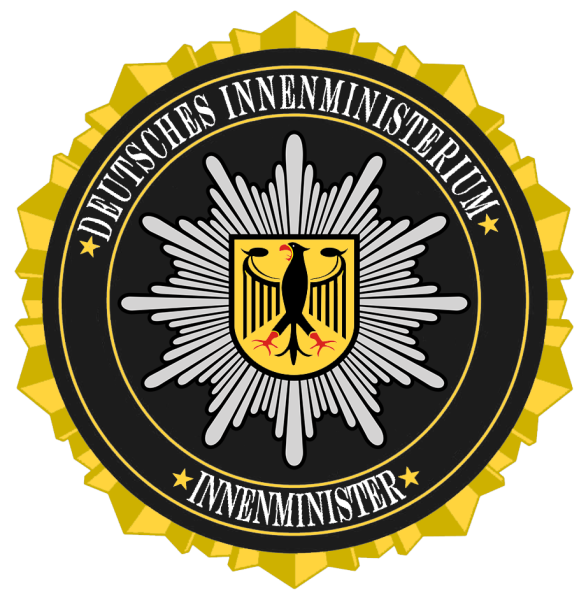Ministry of War: Difference between revisions
No edit summary |
No edit summary |
||
| Line 1: | Line 1: | ||
<div style="background: # | </div> | ||
</div> | |||
<div | |||
style="width: 17%; display: grid; flex-direction: row-reverse; justify-content: space-between; position: absolute; | |||
top: 200px; left: 900px;"> | |||
<div style='"background: #024f63; border: 3px solid #000000; border-radius: 5px; padding: 5px 10px; text-align: center; color:#ebeded; font-size:x-large;">''</div> | |||
<div style="flex-grow: 1; display: flex; align-items: right; justify-content: center"> | |||
<gallery mode=packed-overlay heights=400px image-rendering: crisp-edges; > | |||
File:MOI.png|MOW.png|link=[[Ministry of War]] | |||
</gallery> | |||
</div> | |||
</div> | |||
</div> | |||
==Introduction to the MOW== | |||
The War Ministry, a central institution within the German Empire, plays a vital role in maintaining the strength, security, and stability of the nation. Tasked with overseeing a wide range of strategic and operational functions, it is instrumental in shaping both military and civil affairs that affect the daily lives of citizens and the long-term interests of the empire. | |||
===National Defense and Military Oversight=== | |||
At the core of its mission, the War Ministry is responsible for organizing and maintaining the Imperial Armed Forces. It oversees military planning, training, and logistics, ensuring the armed forces are prepared to defend the nation against external threats. This includes managing defense policy, weapons procurement, and the strategic deployment of military units. | |||
===Internal Security and Intelligence Coordination=== | |||
Beyond external defense, the War Ministry contributes to internal stability by collaborating with intelligence agencies and security services. It supports efforts to counter espionage, sabotage, and subversive activities that could compromise national security, maintaining vigilance against both foreign and domestic threats. | |||
===Civil-Defense Administration=== | |||
The ministry plays a key role in coordinating between military and civilian defensive structures, particularly in regions under martial law or during times of conflict. It ensures smooth governance where military needs intersect with civilian life, facilitating cooperation between local governments and military command. | |||
===Crisis Management and National Emergencies=== | |||
In times of war or national emergency, the War Ministry takes a leading role in mobilizing resources, managing logistics, and coordinating national defense operations. It also contributes to civil defense efforts, disaster response planning, and continuity of government operations during crises. | |||
===Defense Infrastructure and Strategic Development=== | |||
The ministry is heavily involved in the development and maintenance of military infrastructure—such as forts, supply depots, and transportation networks critical to national defense. It also supports research and innovation in military technologies to ensure the German Empire maintains a strategic edge. | |||
===Military Health Services=== | |||
Ensuring the health and well-being of military personnel is another key responsibility. The War Ministry oversees military medical services, field hospitals, disease prevention in the ranks, and rehabilitation of wounded soldiers, working closely with health authorities to support both readiness and recovery. | |||
Revision as of 12:58, 29 July 2025
Introduction to the MOW
The War Ministry, a central institution within the German Empire, plays a vital role in maintaining the strength, security, and stability of the nation. Tasked with overseeing a wide range of strategic and operational functions, it is instrumental in shaping both military and civil affairs that affect the daily lives of citizens and the long-term interests of the empire.
National Defense and Military Oversight
At the core of its mission, the War Ministry is responsible for organizing and maintaining the Imperial Armed Forces. It oversees military planning, training, and logistics, ensuring the armed forces are prepared to defend the nation against external threats. This includes managing defense policy, weapons procurement, and the strategic deployment of military units.
Internal Security and Intelligence Coordination
Beyond external defense, the War Ministry contributes to internal stability by collaborating with intelligence agencies and security services. It supports efforts to counter espionage, sabotage, and subversive activities that could compromise national security, maintaining vigilance against both foreign and domestic threats.
Civil-Defense Administration
The ministry plays a key role in coordinating between military and civilian defensive structures, particularly in regions under martial law or during times of conflict. It ensures smooth governance where military needs intersect with civilian life, facilitating cooperation between local governments and military command.
Crisis Management and National Emergencies
In times of war or national emergency, the War Ministry takes a leading role in mobilizing resources, managing logistics, and coordinating national defense operations. It also contributes to civil defense efforts, disaster response planning, and continuity of government operations during crises.
Defense Infrastructure and Strategic Development
The ministry is heavily involved in the development and maintenance of military infrastructure—such as forts, supply depots, and transportation networks critical to national defense. It also supports research and innovation in military technologies to ensure the German Empire maintains a strategic edge.
Military Health Services
Ensuring the health and well-being of military personnel is another key responsibility. The War Ministry oversees military medical services, field hospitals, disease prevention in the ranks, and rehabilitation of wounded soldiers, working closely with health authorities to support both readiness and recovery.
